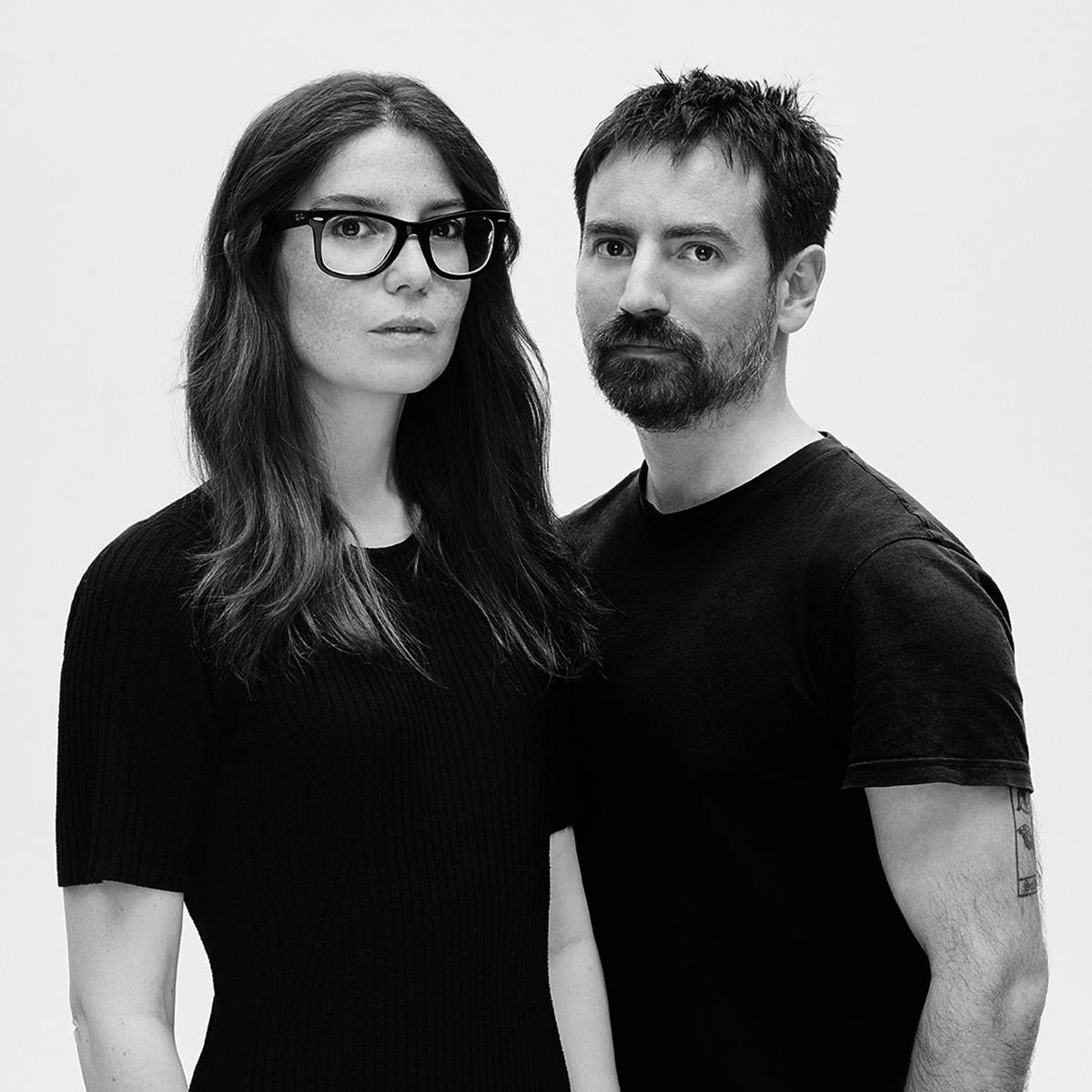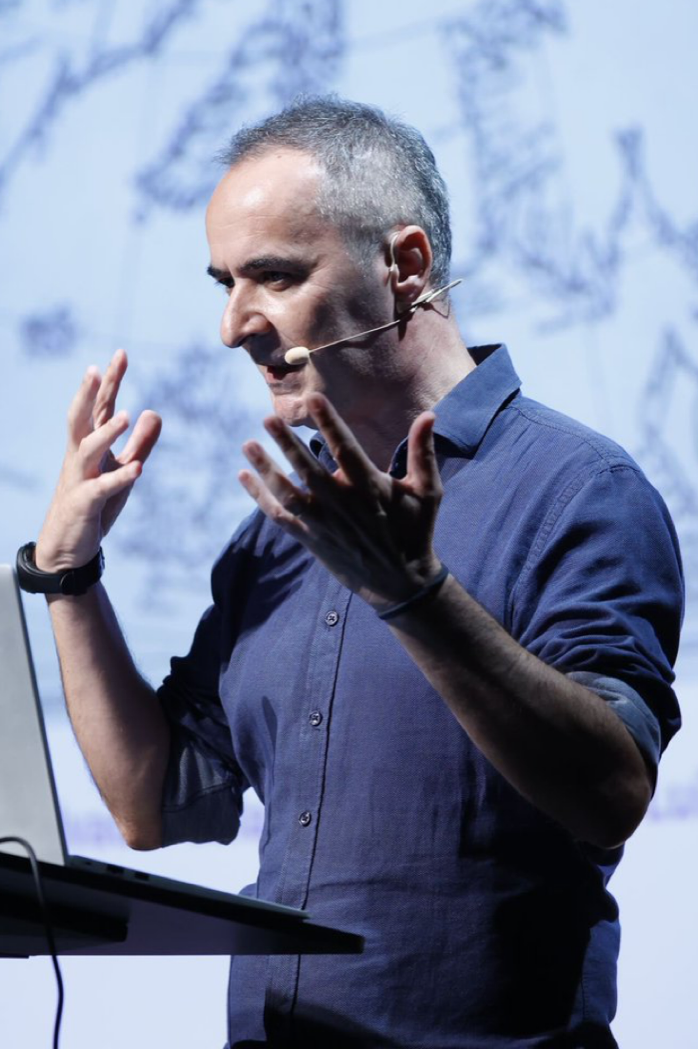Debates y diálogos
Diseño y neurociencia. El impacto del diseño consciente como herramienta de cambio
Design and neuroscience. The impact of conscious design as a tool for change
MIL 111 y Luis M. Martínez
16 feb. 2024
Institución Libre de Enseñanza
— Madrid
Horario
10:00
Horarios de la sede
11:00 - 21:00
Sede
Institución Libre de Enseñanza
Paseo del General Martínez Campos, 14
Entrada
Entrada 16 FEB | Entrada general 4 DÍAS
a la venta aquí
Hora
10:00
La intersección entre diseño y neurociencia constituye una fascinante convergencia entre dos campos de estudio que buscan comprender la compleja relación entre el cerebro humano y su entorno. En esta charla, se explorará la destacada contribución de la neurociencia cognitiva al ámbito creativo, especialmente en el contexto del diseño de espacios, productos y experiencias.
MIL111 es un estudio artístico fundado por los artistas visuales Iria del Bosque Fernández y Borja Bernárdez Armada. Su trabajo se sitúa en el campo del arte de los nuevos medios y reflexiona sobre los procesos emocionales y cognitivos del ser humano desde una perspectiva metafísica evolutiva. A través de diferentes propuestas formales y del uso de la luz, el espacio y el sonido, buscan reflexionar sobre la conciencia del ser, su existencia en el mundo y las múltiples formas en que el ser humano llena los vacíos existenciales.
Luis M. Martínez dirige el Programa de Cognición Humana y el Laboratorio de Analogías Visuales en el Instituto de Neurociencias de Alicante, un centro mixto de la Universidad Miguel Hernández y el Consejo Superior de Investigaciones Científicas. Anteriormente, se formó en la Universidad Rockefeller de Nueva York bajo la dirección de Torsten N. Wiesel, Premio Nobel de Medicina o Fisiología en el año 1981. En su trabajo utiliza una aproximación marcadamente multidisciplinar, incluyendo la neurociencia cognitiva y computacional, la arqueología, la filosofía, las ciencias sociales, la magia y el arte. Su principal interés es comprender cómo la memoria, el razonamiento, la intuición y el contexto social condicionan nuestro comportamiento y percepción de la realidad. Es autor de numerosos artículos científicos, ensayos y columnas de opinión, además de dos libros sobre neurociencia y cognición humana, incluyendo The Illusionist Brain (El cerebro ilusionista) de la Editorial Princeton University Press. Su trabajo es financiado por las más prestigiosas instituciones internacionales, como por ejemplo el European Research Council (ERC) y la Human Frontiers Science Project Organization (HFSP), y ha aparecido reseñado en numerosos medios, incluyendo varios documentales de TV, tanto en España como en el extranjero.
The intersection between design and neuroscience constitutes a fascinating convergence between two fields of study that seek to understand the complex relationship between the human brain and its environment. This talk will explore the outstanding contribution of cognitive neuroscience to the creative field, especially in the context of the design of spaces, products and experiences.
MIL111 is an artistic studio founded by visual artists Iria del Bosque Fernández and Borja Bernárdez Armada. Their work is situated in the field of new media art and reflects on the emotional and cognitive processes of the human being from an evolutionary metaphysical perspective. Through different formal proposals and the use of light, space and sound, they seek to reflect on the consciousness of the being, its existence in the world and the multiple ways in which the human being fills the existential voids.
Luis M. Martínez directs the Human Cognition Program and the Visual Analogies Laboratory at the Instituto de Neurociencias de Alicante, a joint center of the Universidad Miguel Hernández and the Consejo Superior de Investigaciones Científicas. Previously, he trained at the Rockefeller University in New York under the direction of Torsten N. Wiesel, Nobel Prize in Medicine or Physiology in 1981. In his work he uses a markedly multidisciplinary approach, including cognitive and computational neuroscience, archaeology, philosophy, social science, magic and art. His main interest is to understand how memory, reasoning, intuition and social context condition our behavior and perception of reality. He is the author of numerous scientific articles, essays and opinion columns, as well as two books on neuroscience and human cognition, including The Illusionist Brain from Princeton University Press. His work is funded by the most prestigious international institutions, such as the European Research Council (ERC) and the Human Frontiers Science Project Organization (HFSP), and has been featured in numerous media, including several TV documentaries, both in Spain and abroad.




